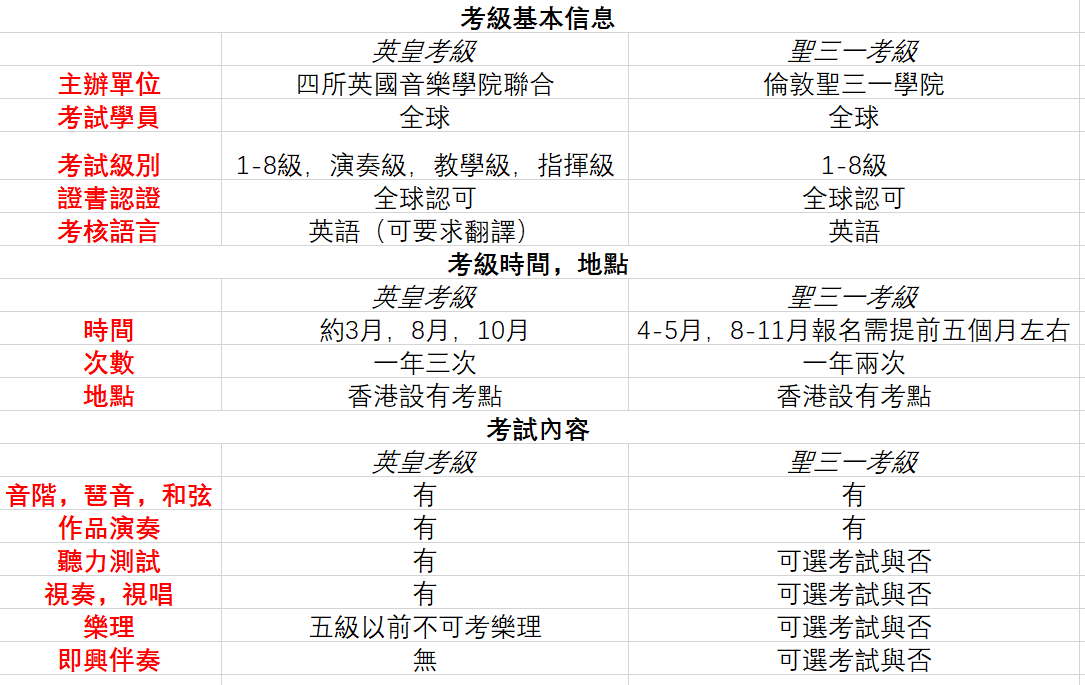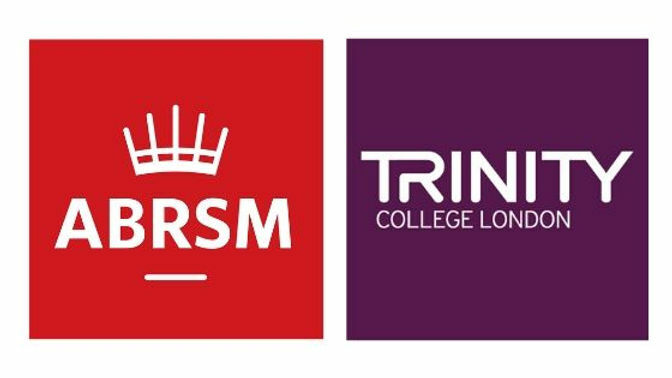Trinity Exams London
Trinity Exams London is one of the world's oldest and most authoritative examination bodies. Over the years, it has gained influence and authority in the UK and around the world.
To learn more about the Holy Trinity Music Examinations, we can compare and contrast the ABRSM examinations (click to review the content of the ABRSM examinations) to see how they relate to each other. Below is a comparison table specially compiled for you by the Against the Moon Music Blog.
II. Having introduced so much about the Trinity Examinations in London, let's talk about the International Examinations.
1. Emphasis on the development of all-round qualities.
Compared to music examinations in mainland China, overseas music examinations not only assess the ability to sing and play music, but also focus on the comprehensive assessment of music knowledge. These international examinations often include much more content than those in China, such as music theory, sight-reading, listening, composition and so on. This is a major requirement for the development of the candidate's overall musical quality.
2. Wide range of repertoire.
Compared to most overseas examinations at the same level, the repertoire chosen in China is more technically difficult and musically simple, so some teachers provide less training and development for children.
In addition, the choice of repertoire is narrower in China. In contrast, the repertoire for the foreign examinations is generally extensive, covering works by many composers, and a significant number of them are unfamiliar to us, both in terms of composers and works. In addition, there is a large selection of 20th century works. Much of the repertoire is musically demanding, but technically less difficult than in China by one or two grades. There are, of course, some examinations where the pieces are not only chosen from the same countries but are arranged at the same level, and these are often musically demanding pieces.
3. Active learning is encouraged.
In order to win the favour of the examiners, candidates need to consciously look at a wide range of musical literature to understand the differences in style between different periods, the history, anecdotes and stories of the major composers, the background to the creation of classical works, how to analyse the form, structure, and The most important thing is to listen to a large number of recordings to compare and analyse them, to confirm the theoretical learning, and to turn passive learning into active research, which is what our students lack most in China.
4. More emphasis on the cultivation of creativity.
For example, the Royal Conservatory of Music's music theory examination is not only professional but also interesting, including some basic compositional skills, such as the creation of rhythms and the creation of an eight-bar melody for a verse, which are essential for the development of creative skills. In addition, most of the overseas examination systems require improvisation or visual accompaniment in the performance section, which is also a means of stimulating creativity.
5. Adding weight to the international scene.
Currently, all of the music grade examinations that are widely recognised around the world come from abroad: Trinity is also recognised by the Qualifications and Credit Framework (QCF), which allows it to be converted into the same qualification as the education systems of many countries. For students who wish to go abroad, taking international music examinations is an opportunity to prove themselves to the world and to add a competitive edge to their qualifications when applying to UK and US institutions.
Three, a link to the London Holy Trinity examinations in Hong Kong has been found specifically for you
4. How to prepare for the London Holy Trinity exam?
Apart from a thorough understanding of the exam content and related requirements, the most important thing is the student's own performance level. Are you still confused by the bottlenecks in practising? Then take a look at the Distance Violin Online Lessons at Counter Moon Music.
Now there are free online audition lessons available, so click on "Audition" to meet your favourite teacher and help you pass your exams, improve your violin playing and enjoy the beauty of music even more.








